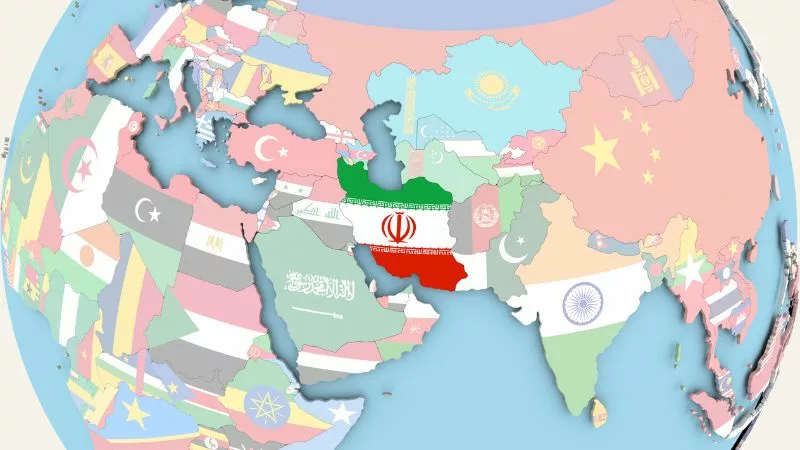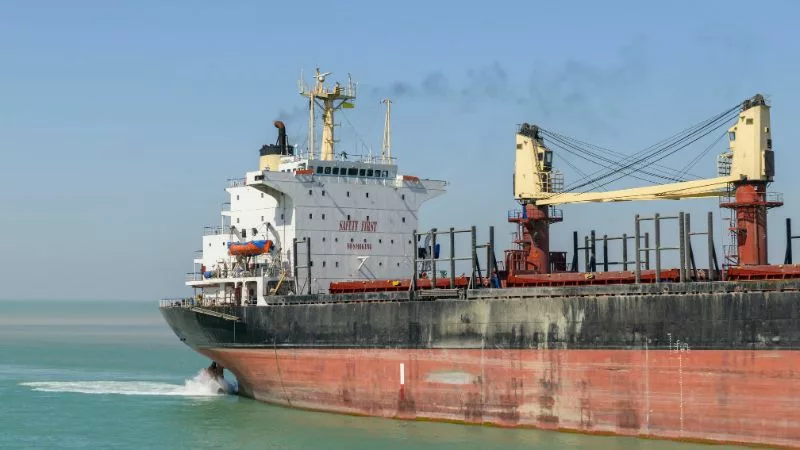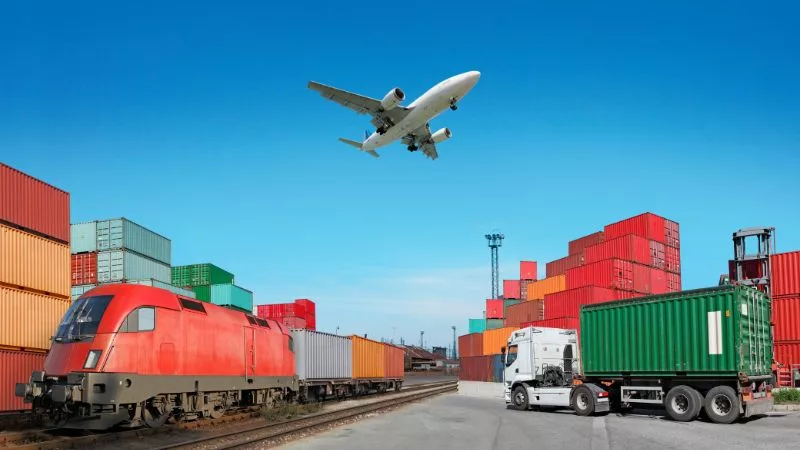Basics of Shipping from China to Iran
Shipping goods from China to Iran can be a rewarding business venture, but it’s important to understand the process and requirements before you start. By following these guidelines, you will be better prepared to handle the logistics and navigate any challenges that may arise.
First, it’s essential to verify if the items you plan to ship are allowed. Make sure your products fulfill particular criteria to avoid any legal issues or customs problems. Some goods, such as weapons or narcotics, are prohibited, so it’s crucial to check for any specific restrictions before cargo shipping.
Second, it’s highly advisable to find a reliable customs broker or agent with strong connections within the Iran customs authority. This individual will play a pivotal role in facilitating your customs clearance process. They will ensure that all necessary documents are prepared and help you navigate through any roadblocks. Remember that shipping from China to Iran involves duties and taxes; freight forwarding is vital to handle these properly.
Regarding freight shipping options, there are three main express services: sea freight, air freight, and rail freight. Each has its advantages and considerations. Choose the optimal one according to your needs.

Required Legal Documents for Shipping
When shipping to Iran, it’s important to have the correct legal documents prepared. The first crucial document is the Commercial Invoice. This acts as a customs declaration for goods into Iran and provides a detailed summary of your shipment, including:
- A description of the contents
- Country of origin
Make sure your Commercial Invoice is accurate and complete because it will be used by customs authorities to assess duties and taxes for your shipment.
Another vital document is the Bill of Lading (BOL) or Air Waybill (AWB) for sea and air freight, respectively. These documents serve as a contract between you and the carrier, outlining the terms and conditions for transporting your goods. When creating the BOL or AWB, ensure you provide:
- The consignor and consignee’s contact information
- A detailed description of the goods
- The total gross weight and dimensions of the shipment
It’s also essential to obtain any necessary permits, licenses, and certificates, depending on the nature of your shipment to Iran. For instance, if you’re shipping specific products like plants or animals, you may require a phytosanitary or veterinary certificate.
The Role of Shipping Agents
It’s important to understand the role that shipping agents play in international shipping. These professionals act as intermediaries between you, the shipper, and the carriers that transport your goods, providing a guide for shipping process.
A professional freight forwarder like Luckystar finds the most efficient shipping solution according to your need for speed, reliability, and shipping cost from China to Iran. Moreover, we handle your cargo’s customs clearance process in the destination country such as Iran customs regulations and documentation in the shipping between Iran and China. In addition, we provide other services like warehousing, cargo insurance, and local delivery after port arrival, ensuring the safety of your package from China to Iran throughout the shipping process. We have:
- The Quickest Mode of Delivery
- Reliable Delivery Timings
- Wide Delivery Coverage
- Efficient Tracking System
Established in 2022, Luckystar is an esteemed member of the Federal Maritime Commission (FMC) and operates as a Non-Vessel Operating Common Carrier (NVOCC). The company’s mission is to deliver superior service quality at reduced costs, primarily serving China, the USA, Canada, and Europe. With core team members boasting over 20 years of experience in logistics, Luckystar brings considerable expertise to the table. Since its inception, the company has been dedicated to offering global door-to-door transport and logistics solutions, emphasizing dependability, adaptability, and responsiveness.
If you’re looking for a freight forwarder to coordinate your shipments from China to Iran, contact us! We guarantee to provide you with the most competitive price available.
Shipping Methods
Air Cargo: If speed is your priority, express air freight is a great choice. It ensures quicker delivery times than other methods, typically taking just 2-7 days in express shipping from Chinese cities to Iran cities. On the downside, air freight costs more, and there may be weight and size limitations for the shipments.
Shipping time:
| Port of loading /port of arrival | Tehran | Mashhad | Shiraz | Tabriz |
|---|---|---|---|---|
| Shanghai | 2-4 | 5-7 | 5-7 | 5-7 |
| Shenzhen | 2-4 | 5-7 | 5-7 | 5-7 |
| Guangzhou | 2-4 | 5-7 | 5-7 | 5-7 |
| Beijing | 2-4 | 5-7 | 5-7 | 5-7 |
| Hongkong | 3-5 | 5-7 | 5-7 | 5-7 |
Ocean Freight: Sea shipping service is often the preferred method for businesses looking to import larger volumes at a lower cost. The transit time and sea shipping rate will depend on your cargo’s size, weight, and destination port. You can choose between Full Container Load (FCL) or Less than Container Load (LCL) based on your cargo volume. Sea freight from China to Iran often takes 23 to 28 days.
Shipping time:
| Port of loading /port of arrival | Chabahar | Bandar Abbas / Kish Island | Bandar Taheri | Bushehr/ Ras Bahrgan | Khorramshahr |
|---|---|---|---|---|---|
| Tianjin | 24 | 25 | 26 | 27 | 28 |
| Dalian | 23 | 24 | 25 | 26 | 27 |
| Shanghai / Ningbo | 22 | 22 | 23 | 24 | 25 |
| Guangzhou/Shenzhen/Hongkong | 20 | 21 | 22 | 23 | 24 |
| Qingdao | 23 | 24 | 25 | 26 | 27 |
Express Shipping Services: If you need your goods to arrive in Iran as soon as possible, express shipping services might be the best way to go. These services offer door to door shipping and often have faster transit time, often taking about a week. However, the shipping fees can be significantly higher, so it’s essential to weigh the benefits against the expense.
Considerations on Shipping by Sea
When you import from China to Iran, there are a few key factors to remember. In this section, we’ll discuss how to utilize the services efficiently and what factors can impact the overall experience.
Port to Port Service
Port to Port service is the most basic type of shipping service, where your cargo transfers from one port to another. Iran’s main seaports are concentrated in the Persian Gulf, such as Bandar Abbas Port, Khomeini Port, Bushehr Port, Asaluye Port, and the newly built Chabahar Port.
Here are some tips when using the Port to Port service:
- Make sure to communicate with both shipping companies at the ports of origin and destination.
- Keep track of transit times, as sea shipping from China to Iran typically takes around 23 to 28 days, depending on the route and customs clearance requirements.
Door to Door Service
Door to door shipping service makes the shipment process more convenient for you, as the shipping company handles all aspects from picking up the cargo at the point of origin to delivering it to the final destination. Here are some things to consider when utilizing door to door delivery service:
- Cost: The FOB price for a parcel in maritime transport ranges from US$ 15 to US$ 25 per cubic meter.
- Shipping containers: A 20-foot container freight’s typical FOB cost from Guangzhou, China to Bandar Abbas, Iran is around US$ 2000.
- Transit times: Door to door service can take a bit longer than Port to Port due to added logistics. However, it’s important to remember that transit times can vary based on destination, shipping route, and customs clearance requirements.

Considerations on Shipping by Air
The average air cargo from China to Iran ranges from $4 – $10 per kilogram. Be sure to factor in additional customs duties, taxes, and handling fees that may apply. In addition to cost, smaller and lighter packages can be easily and more cost-effectively shipped through air freight.
Moreover, knowing any restrictions and regulations surrounding air freight shipment is important. Certain items, such as hazardous or flammable materials, are prohibited or restricted on air freight service. Ensure that your cargo complies with the International Air Transport Association’s (IATA) guidelines on dangerous goods before attempting to ship by air. Here are some special terms of Iran Air.
- Except for solid carbon dioxide (dry ice) used as refrigerant, consolidated dangerous goods are not accepted for transportation.
- All packages and overpacks required by the Instructions must be marked in English. If the country of origin requires the use of markings in a language other than English, both languages must be equally prominent.
- Explosives are prohibited by Iran Airlines, except for cartridges for power plants (acceptable only when supplied to Iran Air as Aircraft Spare Parts) and sporting ammunition.
- (Chemical) Oxygen Generators with the following instructions will not be accepted for carriage: Organic flammable solids, Barium peroxide, Oxidizing Solids, Potassium perchlorate, Sodium chlorate, Sodium peroxide, Potassium superoxide, Sodium superoxide, Chemical Oxygen Generators. Oxygen generators containing substances without specific shipping names such as iron powder, iron filings, silica, and manganese dioxide are prohibited.
- Iran Air does not accept the following dangerous goods for carriage: Ethylene oxide, Methyl chloride, Nitromethane, Toluene, Lithium aluminum hydride, Acetic anhydride, Benzyl chloroformate, Hydrofluoric acid and sulphuric acid mixture, Titanium tetrachloride, Aerosols, flammable gas and corrosive, Sodium chlorate, aqueous solution, Iodine pentafluoride, and Lithium nitride.
Lastly, remember that air shipping usually involves multiple carriers and cargo handling companies. Your shipment may be transferred between many shipping companies during its journey. It’s essential to choose reputable and reliable shipping agencies to ensure the safety and efficiency of your air freight transit.
Customs Regulations in Iran
You must knowprohibited and restricted items to avoid delays and penalties. Iran’s Customs Law prohibits the import of various goods, including those listed in the customs tariff and special laws, weapons, drugs, special equipment for aerial photography and videography, transmitters and spare parts, disruptive singing and publications, foreign banknotes and lottery. Additionally, products with misleading packaging or labeling are also prohibited.
Besides, Iran is very strict on the inspection and quarantine of goods imported into Iran. The following are the related regulations.
- Inspection-required products: If the imported products require legal inspection into Iran, you need to undergo mandatory legal inspection VOC (Verification of Conformity, compliance inspection) and obtain a COI Certificate (Certificate of Inspection for Exports to Iran).
The test is carried out by the Iranian Standards and Industrial Research Institute (ISIRI) authorized by the Iranian government and is responsible for managing the quality of goods imported to Iran. Forensic inspection products that arrive at Iranian ports but do not undergo the certification will be refused customs clearance for entry. The importer will be required to ship the goods back to the country, or have the goods sampled and inspected by relevant agencies. The consequences of the delay and related costs will be borne by the importer.
- Certain foods, beverages, medicines, and toilet equipment: the label must indicate:
(1) the name of the product and the address and origin of the manufacturer;
(2) the trademark registration number in Iran;
(3) The license number and date issued by the Ministry of Health to allow the production and sale of products in Iran.
- Live animals, bees and insects, poultry eggs, plant roots, bulbs, stems, twigs, fresh fruits and vegetables, seeds and any plants or plant parts: health certificates from the country of origin are required, and With prior permission from the Ministry of Agriculture of Iran.
- In addition, veterinary medicinal products (including feeding concentrates and supplementary feeds): You must submit a certificate stating that the product is freely produced, used and sold in the country of origin in accordance with the requirements of the Ministry of Agriculture of Iran. This certificate must be approved by the Veterinary Medicine Department of the Ministry of Agriculture of the country of origin.
For a smooth customs clearance process in Iran, make sure to prepare the essential documents. These readily available documents can speed up the clearance process, minimizing potential delays. Here are the required documents:
- Commercial ID
- Delivery Order
- Warehouse Receipt
- Bill of Loading
- Packing list
- Proforma Invoice
- Certificate of Origin
- Standard Certificate
- Order of Registration
- Logical Permission
According to customs management rules and regulations, the tariffs for Iran’s main commodities are as follows:
| Product classification | tax rate(%) |
| Chemical products, metal products, measuring instruments, pharmaceutical products and others | 10~20 |
| Food, minerals, leather, textiles, paper, machinery and equipment | 15~20 |
| Agricultural products, electronic equipment | 25~50 |
| Transportation and accessories | 25~120 |
Insuring Your Shipments
Insurance helps protect your cargo from unexpected events and damages, offering some peace of mind during the shipping process. In this section, we will guide you through the basics of shipping insurance to ensure a smooth and risk-free transportation experience.
To begin with, calculate the insurance premium for your shipment. The insurance amount can be determined by multiplying the CIF invoice price by 110% (or up to 120% for special cases). The premium is then calculated by multiplying the insurance amount by the insurance rate.
Insurance amount = CIF invoice price * 110%
Insurance premium = insurance amount * insurance rate
Selecting an insurance provider is the next crucial step. Work with a reliable and reputable insurance company, as they will likely offer better coverage, support, and overall service. Make sure to carefully review the coverage and any exclusions or limitations that may apply to your specific shipment.
It’s also important to engage a trusted shipping company. Many freight forwarders, such as Eurosender and DDPCH, provide door-to-door services and include basic insurance coverage by default. However, it’s essential to confirm the extent of the protection provided and consider obtaining additional coverage if needed.
Finally, establish a relationship with a reliable customs broker or agent with strong connections with the Iranian customs authority. This person is crucial in facilitating the customs clearance process, ensuring that your shipment is properly insured and the required paperwork is in order.

Dealing with Shipping Delays
Shipping delays can be quite troublesome, especially in the transport from China to Iran. To help you manage these delays effectively and maintain a friendly tone, here are a few key points to keep in mind:
1. Understand the common causes of delays: Firstly, it’s important to know the typical reasons behind shipping delays, including global emergencies like pandemics, wars, unforeseen weather conditions, and increased freight costs. This knowledge will allow you to be prepared for potential hurdles and put mitigation plans in place.
2. Choose the right shipping method: Choose the one that best suits your requirements, considering aspects like delivery speed, cost, and reliability.
3. Stay in touch with your supplier: Regularly check in with your supplier in China and keep yourself updated on their production progress and any potential issues. This will help you anticipate potential delays and adjust your plans accordingly.
4. Monitor global supply chain news: Keep yourself informed about the current shipping landscape by following global supply chain news and updates. This can provide valuable insights into ongoing challenges and potential disruptions in the industry.
5. Have a backup plan: It’s always a good idea to prepare for potential shipping delays. This could include having alternate suppliers, alternative transportation methods, or extra inventory to buffer against delays.
Shipping Regulations and Compliance
When shipping goods between China and Iran, it’s crucial to understand and comply with the shipping regulations. This helps to ensure smooth transportation and avoid delays or penalties. Here are some essential aspects of shipping regulations and compliance you need to familiarize yourself with.
Firstly, double-check the goods you’re importing, paying attention to customs restrictions in both China and Iran. Certain goods, like weapons, hazardous materials, and counterfeit items, are prohibited. Other goods, such as technology and food products, may require specific permits or certifications.
Next, make sure your shipments are properly packaged. Use sturdy boxes, bubble wrap, or other protective materials to keep your goods safe and secure during transportation. Also, ensure that your shipment’s dimensions are within the allowable size and weight limits for the shipping mode you choose.
Documentation is another vital aspect of shipping compliance. You will need to prepare accurate and complete documents for customs clearance in both countries. Some essential paperwork includes commercial invoices, packing lists, and shipping labels. Don’t forget to clearly mark the total value of your shipment and specify the harmonized system (HS) codes for the goods you’re importing.
To avoid any unexpected taxes or duties, familiarize yourself with the customs duty rates and regulations in Iran. You can check the tariff rates and import regulations on Iran’s customs authority website. Be prepared to pay any duties or taxes upon arrival, and make sure the appropriate paperwork is in place for a smooth clearance process.
Lastly, choose a reliable shipping partner with experience in handling shipments between China and Iran. They can help guide you through the process, provide advice on different shipping modes (air, sea, rail, road), transit times, and ensure that your shipment adheres to all regulations.
Frequently Asked Questions
What are the costs of shipping goods from China to Iran?
The cargo shipping cost from China to Iran can vary depending on several factors such as the type of cargo, the size and weight of the shipment, the shipping method, and the urgency of the delivery. To get an accurate estimate, it’s best to contact a freight service provider with your shipment details.
What is the cheapest shipping option between China and Iran?
Sea freight is generally the cheapest shipping option. However, it might take longer than other methods like air freight from China to Iran. When considering the costs, it’s essential to weigh both the price and the transit time to determine the most cost-effective option for your specific needs.
Which companies offer the best shipping services from China to Iran?
Several companies provide services for shipping from China to Iran, so it’s essential to find one based on your requirements and budget. Some of the reputable providers include DDPCH, HipoFly, and FBABEE. Conduct thorough research and reviews to select the most suitable company for your shipping needs.
How long does it take to ship items from China to Iran?
The transit time for shipping items from China to Iran depends on the shipping method chosen. Sea freight usually takes around 23-28 days, while air freight can take 2-7 days. Rail and road freight might take approximately 15-20 days. These durations can vary based on customs clearance procedures and other logistical factors.
Is door-to-door shipping available from China to Iran?
Yes, some service providers offer door-to-door shipping from China to Iran. This service includes collecting your goods at the origin, handling customs clearance, and delivering the shipment directly to the destination address. Remember to confirm with your chosen shipping company if they offer this service to ensure a smooth shipping process.
Can I use China Post for shipping goods to Iran?
Yes, China Post offers shipping services between China and Iran, but it’s essential to ensure that your shipment meets their size and weight restrictions and that your items are not prohibited. However, for larger cargo or more specialized shipping needs, it might be worth considering a shipping company with expertise in the specific type of freight you need.
